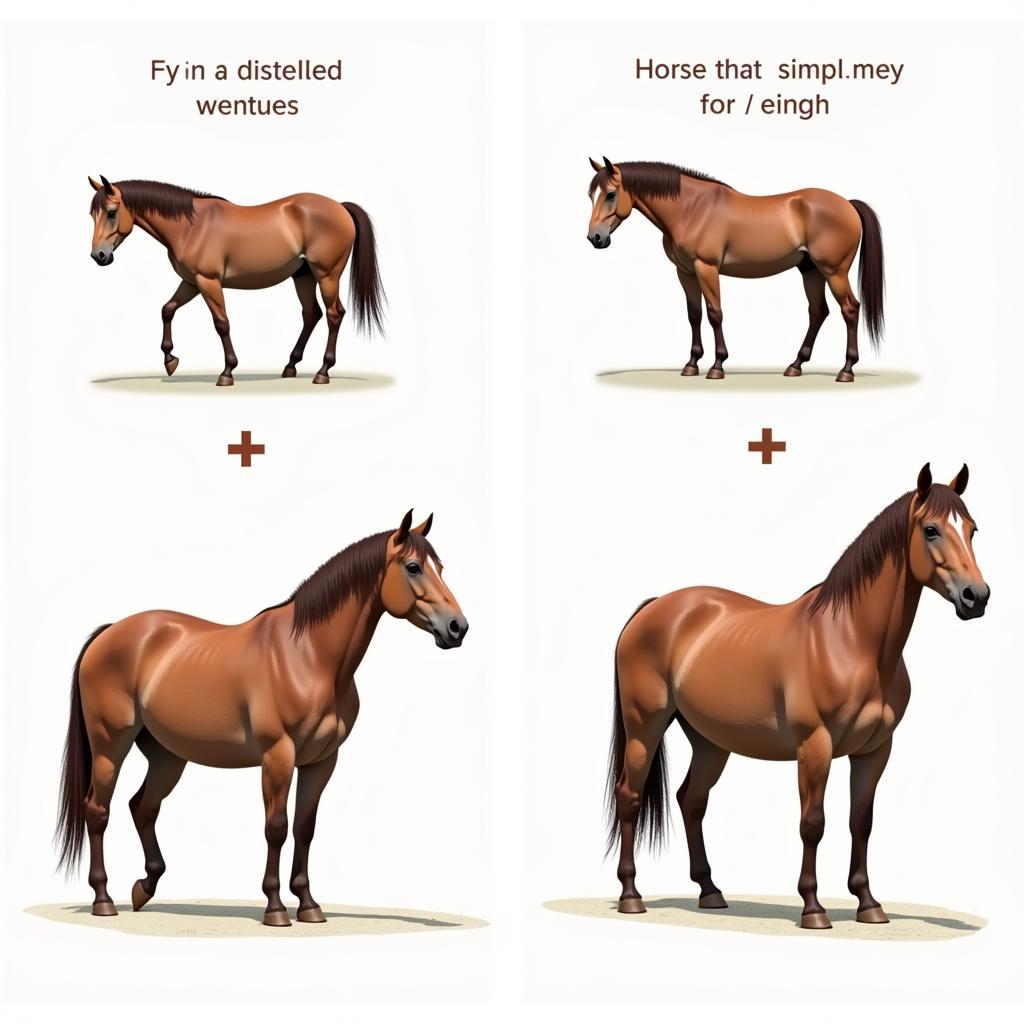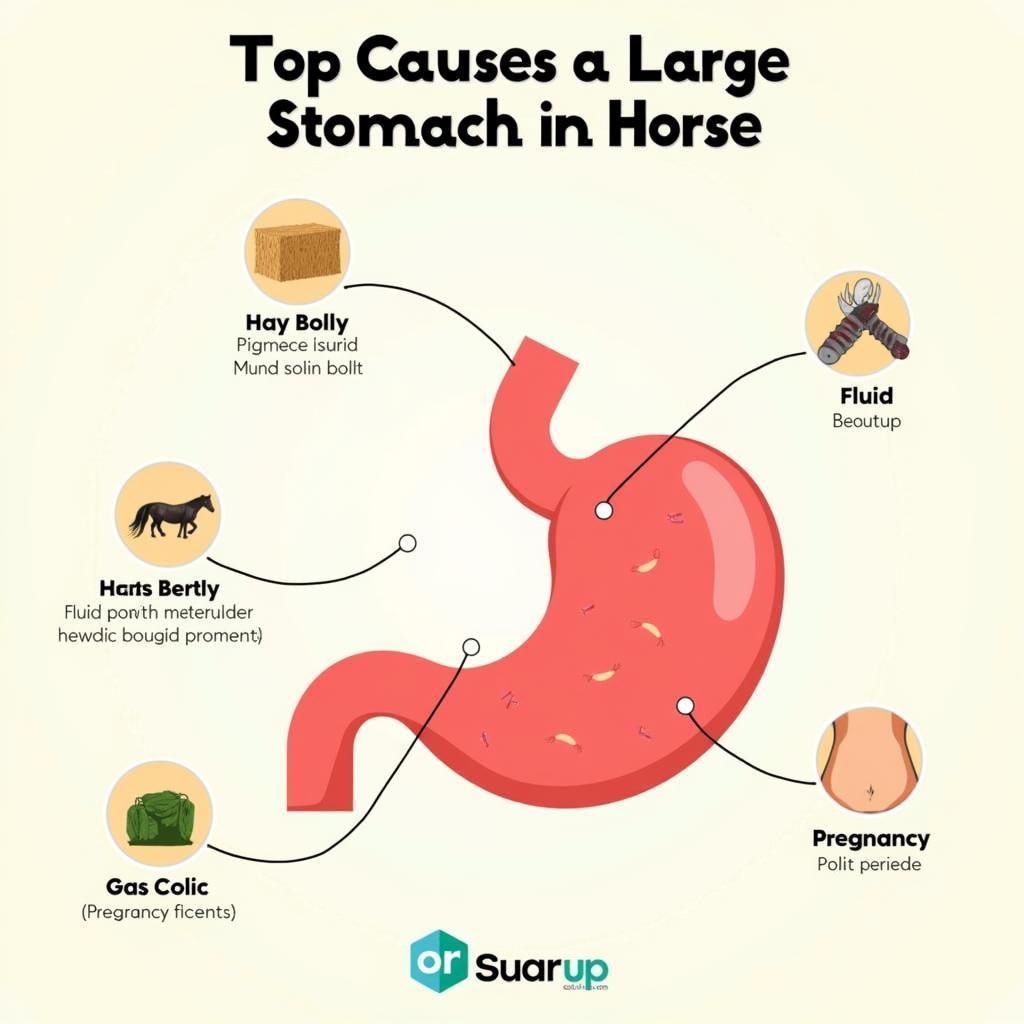A horse with a large stomach can be concerning for any owner. Is it simply a full belly, or could it be a sign of something more serious? This article will explore the various reasons why a horse might appear to have a large stomach, from normal variations to potential health concerns, and what you can do to ensure your equine companion’s well-being.
While a rounded belly might just mean a well-fed horse, it’s crucial to understand the difference between a healthy, full stomach and one indicative of an underlying problem. Several factors contribute to the appearance of a large stomach, including body condition, diet, parasite load, and potential medical conditions.
Is My Horse Overweight or Does it Have a Large Stomach?
Distinguishing between a large stomach and overall obesity is essential. A genuinely large stomach often protrudes disproportionately, while an overweight horse will have fat deposits throughout its body, including along the neck, back, and tailhead.  Horse with a Large Stomach vs. Overweight Horse
Horse with a Large Stomach vs. Overweight Horse
Properly assessing your horse’s body condition score (BCS) is crucial. This involves visually and manually evaluating the amount of fat covering various points on the horse’s body. A BCS chart can help you determine if your horse is underweight, ideal, overweight, or obese.
Causes of a Distended Abdomen in Horses
Several factors can contribute to a horse appearing to have a large stomach. Here are some common causes:
- Hay Belly: A high-fiber diet, particularly one consisting of large amounts of low-quality hay, can lead to a distended abdomen, often referred to as “hay belly.” This is because digesting large quantities of fiber requires a larger gut capacity. Consider switching to a slow horse feeder to help regulate intake.
- Parasites: Internal parasites, such as roundworms, can cause inflammation and fluid buildup in the abdomen, resulting in a pot-bellied appearance. Regular deworming is crucial for preventing and managing parasite infestations. Learn more about bot egg removal from horses.
- Fluid Buildup (Ascites): Certain medical conditions can cause fluid to accumulate in the abdominal cavity, leading to a swollen belly. This can be a serious issue requiring veterinary attention.
- Gas Colic: Gas colic can cause a distended and painful abdomen. This is a medical emergency and requires immediate veterinary intervention.
- Pregnancy: In mares, a growing fetus will obviously cause an increase in abdominal size.
 Causes of Abdominal Distension in Horses
Causes of Abdominal Distension in Horses
What Should I Do if My Horse Has a Large Stomach?
If you notice your horse has a disproportionately large stomach, it’s important to consult with your veterinarian. They can perform a thorough examination, including blood tests, fecal exams, and potentially abdominal ultrasound, to determine the underlying cause.
“Early diagnosis is key,” says Dr. Emily Carter, DVM, an equine specialist with over 20 years of experience. “The sooner we identify the cause of a distended abdomen, the more effectively we can treat it and prevent potential complications.”
Feeding Strategies for Horses with Large Stomachs
If your horse’s large stomach is due to a high-fiber diet, consider switching to a higher-quality hay or incorporating a slow feeders for horses. This can help regulate intake and prevent overconsumption of fiber. You may also want to consider purina miniature horse and pony feed for its balanced nutrition.
The Importance of Regular Veterinary Checkups
Regular veterinary checkups are essential for maintaining your horse’s overall health and identifying potential problems early on. This includes routine vaccinations, deworming, and dental care.
“Preventive care is the best medicine,” advises Dr. Carter. “Regular checkups allow us to monitor your horse’s health and address any issues before they become serious.” Knowing the function of the horse spleen is also important.
Conclusion
A horse with a large stomach can be a sign of various underlying issues, ranging from dietary factors to serious medical conditions. By understanding the potential causes and seeking veterinary advice when necessary, you can ensure your horse receives the appropriate care and maintains optimal health. Early intervention is often crucial for a successful outcome.
FAQ
-
Can a horse’s stomach naturally be larger than others? Yes, some horses naturally have a larger abdominal capacity than others.
-
Is a “hay belly” harmful to my horse? While not inherently harmful, it can be aesthetically displeasing and may indicate the need for dietary adjustments.
-
How often should I deworm my horse? Consult with your veterinarian to determine an appropriate deworming schedule based on your horse’s individual needs and the prevalence of parasites in your area.
-
What are the signs of colic in horses? Signs of colic include pawing, rolling, flank watching, sweating, and a lack of appetite.
-
When should I contact my veterinarian about my horse’s large stomach? Contact your veterinarian if the distension is sudden, severe, or accompanied by other symptoms such as pain, lethargy, or loss of appetite.
If you need assistance, please contact us: Phone: 0772127271, Email: [email protected] or visit our location: QGM2+WX2, Vị Trung, Vị Thuỷ, Hậu Giang, Việt Nam. We have a 24/7 customer service team.